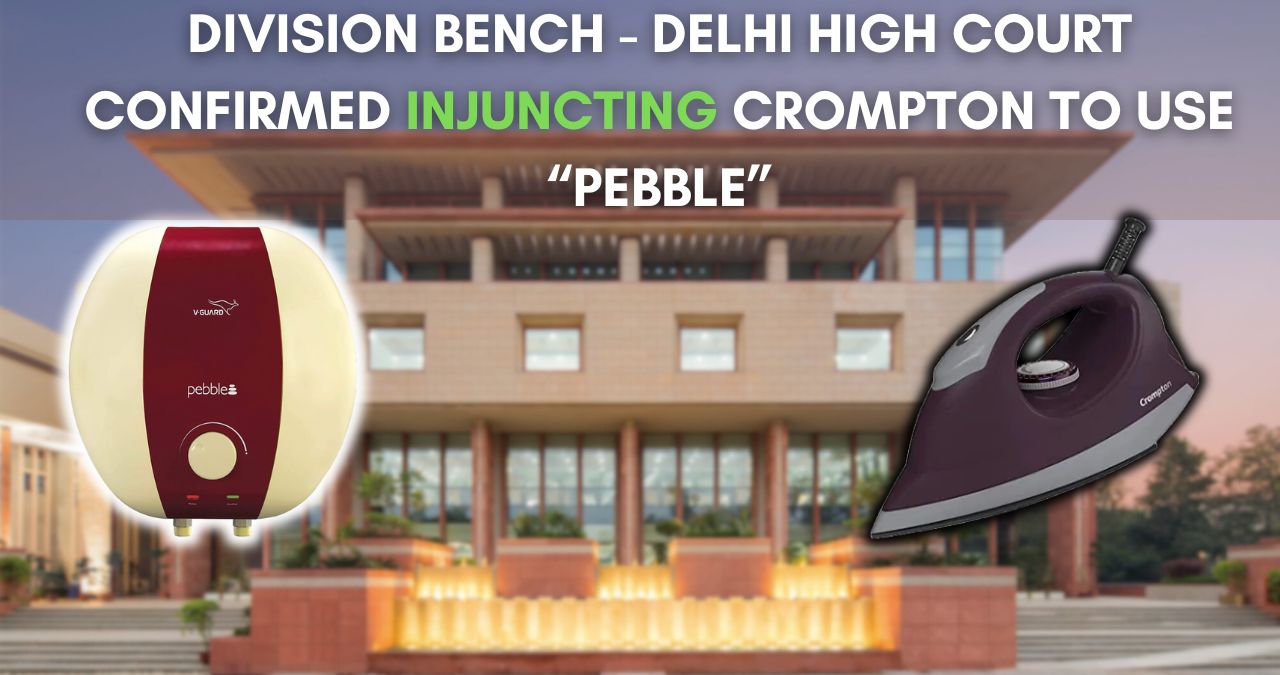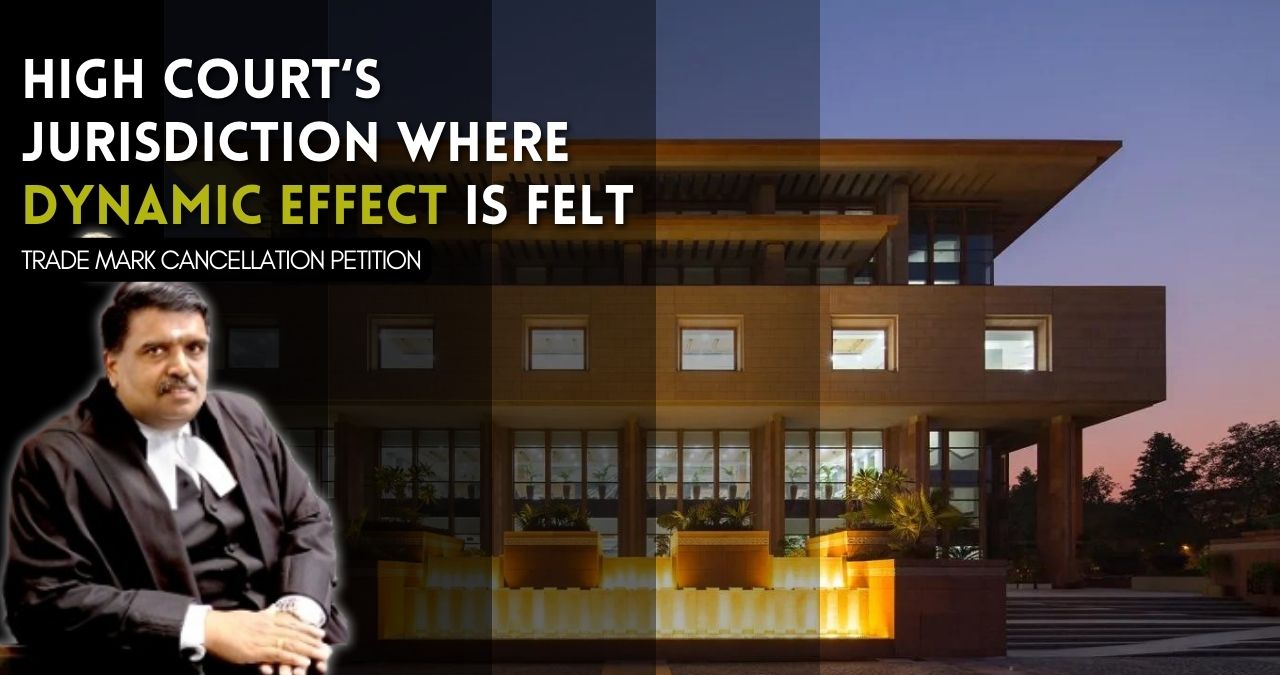The Hon’ble Division Bench presided by HMJ Amit Mahajan and HMJ Vibhu Bhakhru upheld the decision of the Ld. Single Judge injuncting the Appellant (Crompton) from dealing in electric irons under the impugned mark “PEBBLE”.
Why Appeal was preferred?
- Crompton Greaves Consumer Electricals Ltd. (Crompton / Appellant) filed appeal impugning Order dt. 12.05.2022 wherein the Ld. Single Judge allowed V-Guard Industries Ltd. (V-Guard / Respondent)’s Injunction Application was allowed, restraining appellant from dealing in electric irons under the impugned mark “PEBBLE”.
Brief Facts:
- V-Guard filed a suit for trade mark infringement and passing off against the Crompton for the use of the mark PEBBLE by the Appellant for its electric iron, which is identical to the Respondent’s mark PEBBLE used for its water heaters.
| V-Guard’s mark | Crompton’s mark |
 | |
| Registered in Class 11 since 26.03.2013 for goods being water heaters, electric water heaters, heating coils, electric water geysers. | Pending Application in Class 7 for electric irons and other goods – later registered during pendency of Appeal |
V-Guard’s contentions raised in the suit:
- The word PEBBLE is an essential and prominent part of its label mark and thus, it has an exclusive right qua the said word in respect of the electric good.
- The company has been selling electrical products since the year 1977.
- The company’s total turnover is of over Rs. 2600 Crores.
- Its Products are available across India and other countries including Nepal, Sri Lanka, and UAE.
- It has been selling water heaters, electric water heaters, water geysers, etc. under the label PEBBLE since the year 2013.
Crompton’s contentions raised in the suit:
- The company is using their mark w.r.t. electric irons falling in Clause 8 and therefore, there is no likelihood of any confusion.
- The mark PEBBLE is used along with its well-known house mark CROMPTON.
- The word CROMPTON is claimed to be prominent part of the Appellant’s mark.
Impugned Order:
Issues Framed:
- Whether the marks are similar/identical?
- Whether the goods are similar so as to entitle the Plaintiff for an order of injunction under the provisions of Section 29(2) of the TM Act?
- Whether the prima facie case for passing off is made out?
Held:
- PEBBLE is an essential and dominant part of the Plaintiff’s registered mark and Plaintiff can assert its rights for the exclusive use of the word PEBBLE on the basis of its registration.
- Prima facie the impugned mark PEBBLE is phonetically/visually/structurally identical to the dominant part of the Plaintiff’s registered trade mark.
- Since the competing goods are not similar and thus the Plaintiff has not made out a case for infringement against the Defendant under Section 29(2) of the TM Act.
- PEBBLE is not descriptive of water heaters and is an arbitrary word entitled for high degree of protection.
- It held that the Plaintiff has made out a prima facie case of passing off and use of the mark by the Defendant will likely to deceive the consumers.
Appellant’s submissions:
- Respondent cannot be allowed to monopolize the word PEBBLE.
- Respondent did not claim that they intend to sell electric irons under the mark PEBBLE.
- Respondent does not have a word mark registration and only has a device mark registration in Class 11.
- Parameters of Section 29(4) of the TM Act is not satisfied and threshold of the aforesaid provision is very stringent.
- Marks are to be compared as a whole.
- The added matter in the Appellant’s mark is sufficient to distinguish its goods from that of the Plaintiff’s.
Respondent’s Submissions:
- Plaintiff was able to prima facie establish its reputation and goodwill in terms of Section 29(4) of the TM Act. Present case fulfils all the necessary ingredients of the aforesaid provision.
- Similarity between the two marks is so close that no further evidence is required to establish that consumer would be confused while making the purchase.
- PEBBLE is an arbitrary mark for the purpose of electrical goods, and is, therefore, entitled for the protection.
Judgement
Reasoning:
If the plaintiff claims that the registered trademark has a reputation in India, an injunction can be sought even if the goods on which the similar trademark is applied are not similar, that is, however, subject to other ingredients of Section 29(4) being satisfied (All three needs to be satisfied).
Ld. Single Judge held that the competing goods are not similar. However, competing marks are similar and Respondent’s mark has a reputation in India and Appellant has been using the mark without due cause to take unfair advantage of Respondent’s registered trademark’s distinctive character/repute.
Three Conditions of 29(4) that need to be proved:
- Similarity of the two marks.
- An injunction can be granted if the dominant part of the Defendant’s trademark is similar to the dominant part of the Plaintiff’s trademark. PEBBLE is dominant part of the Defendant’s trademark. Plaintiff’s trademark’s dominant part is undeniably PEBBLE only. Both marks are similar.
- Mark is used in relation to the goods and services which are not similar to those for which the trademark is registered.
- It is Appellant’s own case that the competing goods are not similar and therefore the second ingredient is satisfied.
- The registered trademark has a reputation in India and the use of the mark without due cause takes unfair advantage of or is detrimental to the distinctive character or repute of the registered trademark.
- Section 29(4) relates with dilution principle which does not require the presence of deception and confusion. Section 29(4) uses the expression ‘reputation’ and not ‘well-known mark’. Therefore proprietor need not show that the mark a well-known but prima facie satisfy that the mark has a reputation in India. Prima facie indicator of reputation of the mark can be sales figures and the promotional expenses. Even in case where there is no likelihood of confusion, the use of the trademark by a third party can be protected in case it is shown that the registered mark has a reputation and a distinctive character. Held that third ingredient in present case was satisfied.
Precedents relied:
| Precedents | Purpose/Proposition |
| Renaissance Hotel Holdings Inc. v. B. Vijaya Sai and others : (2022) 5 SCC 1 | Interpreted Section 29(4) of the TM Act. |
| United Biotech (P) Ltd. v. Orchid Chemicals & Pharmaceuticals Ltd. : 2012:DHC:3447-DB | When a label mark is registered, it cannot be said that the word contained therein, is per se not worthy of protection. |
| Bloomberg Finance LP v. Prafull Saklecha & Ors. : 2013 SCC OnLine Del 4159 | The object of the “dilution” form of infringement (under Section 29(4)) in effect, is a wider trademark protection without the concomitant likelihood of confusion requirement, as it is in respect of dissimilar or unrelated products and services. |
Conclusion
Upheld the injunction order passed by the Ld. Single Judge.
Adv. for Appellant: Mr. Darpan Wadhwa, Senior Advocate with Mr. Hemant Daswani, Ms. Saumya Bajpai, Ms. Dimita Vyas, Mr. Kunal Prakash, Mr. Amer Vaid & Ms. Neelashi Bhaduria, Advs.
Adv. For Respondent: Mr. Jayant Mehta, Senior Advocate with Mr. Sachin Gupta, Mr. Ajay Kumar, Mr. Manan Mondal, Mr. Rohit Pradhan, Ms. Prashansa Singh



